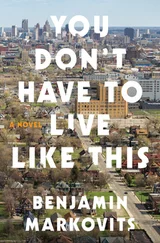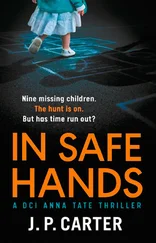I looked around for the man who had accosted me, but he was lost, reabsorbed by the throng of sheets. His questions had made me miss something in the Manager’s speech, something I didn’t know how to get back. Maybe I could ask my partner what I had missed, what other dangers I needed to avoid. Maybe my partner would be nice and not remind me of anything dangerous. Then the applause broke out all around me, loud and unhuman like the waves or the rain, and it was a moment before I remembered to join in, flinging my hands together in front of me, clapping until they hurt, trying to create in real life the small picture of an ideal Churchgoer that I had in my mind.
As we thronged from the room, sheets dragging across the carpet, someone stopped me and gave me a slip of paper that read E38 . “Your room assignment,” she said, her voice upbeat but not inspiring confidence. As I filed out the doorway into the corridors beyond, I saw a slight, sheeted figure up by the podium being reprimanded by the Regional Manager. I couldn’t help thinking it was the man I had met before, the man who was my size, the man who made me miss that key part of the speech I needed to become the ideal person I had come here to be, a person who wasn’t.
IN THE HALLWAY OUTSIDE THEconference room, it was easy to pretend I knew where I was going: I followed the others, who filed unanimously toward a tight, cramped back staircase painted a nostalgic shade of mint. We were all new intake, fresh bodies for the Church to process, but as far as I could tell I was the only one who didn’t know the layout of the building. The others navigated it by instinct, down flight after flight of stairs, taking the sharp turns of the staircase with ease, while I let my body get pushed along by their collective motion. I couldn’t understand how they knew what to do — it was the first day and I had already fallen behind. The crush of bodies was a slow river of white, crowding our way to the goal. It reminded me of something I might once have seen on a nature documentary, the spawning of sharks or salmon.
We skipped one unmarked entrance after another, then suddenly the sheeted bodies were passing through a blank doorway painted glowingly green. In this new, subterranean corridor our unified motion disintegrated. Eaters split off to look for their assigned spaces while I pressed my back against the wall, trying to breathe, trying to fake a type of composure that would indicate that I was brimming with Light, quick to shake off the Darkness. It was while I hid here, in plain sight, that I began to notice that there were other Eaters like me who were not adjusting well. There in the midst of a traffic of white, they stood frozen, staring ahead of them or covering their eyes. Backs hunched, heads down in their hands, they looked as though they were wishing themselves out of this place or mourning their lack of know-how. Some came out of their stupor on their own and headed casually to their quarters; others were collected by low-level Managers and led away.
Then I saw a flash of skin in the white throng and some blue and green. In the sea of white, these colors looked wrong, a stain that was somehow moral. It took a moment for the colors to resolve into the shape of a human being, but when they did I recognized him instantly as one of the Disappeared Dads I had seen on TV. He had vanished while watching his eight-year-old son playing soccer in the park. He wore a green plaid button-up shirt and blue jeans, and he was pacing around the crowded floor with his left hand in his pocket and his right hand up to his ear as though he were talking on a cell phone. “No can do, no can do,” I heard him say out loud, again and again. He looked the same as he had on the news, only his face was vividly pink.
As I watched him talk on his imaginary cell phone, I saw a pair of Managers come up next to him, sheeted up in coverings that bore the shape of the Renunciation Mouth. They spoke to him, poked at his exposed flesh. Their voices were muffled, but I could tell they were trying to get him to put his sheet back on. “No can do,” he said. “I gotta be comfortable. I gotta be comfortable. No can do. Have you seen my slippers?” They looked at each other and grabbed him by the arm. Gently, firmly, they pulled him out of my sight, into the crowd beyond.
I looked around and saw a girl next to me, who had been watching them, too.
“Did you see that?” I asked.
“No,” she replied.
“It was one of the Disappearing Dads,” I said. “Hank. Or something.”
“I don’t think we’re supposed to remember that,” she said, sounding nervous.
“Where do you think they’re taking him?” I asked.
She shook her head.
“Do you know where E38 is?” I asked.
But she was already walking away.
BY THE TIME I FOUNDE38, my partner was already inside waiting for me. I had expected a room, but what I found was more like a medical examination tent, set up within the larger central space for emergencies. Instead of walls we had curtains: deep red curtains made of cheap velvet, strung up on metal rods that shook when someone heavy walked by. There was a small collapsible table and a rolling rack for holding an IV or a coat. A steel-rimmed mirror in the corner turned out to be a to-scale painting of the curtains, so that you stood in front of it expecting to see yourself, and instead you saw Nobody. One double-size cot done up in stiff red sheets sat in the center of a room that was barely larger. A girl lay atop this cot, sheetless and splayed out in the center like a starfish, so that she took up roughly the entire space. She lifted her head and glared at me.
“You’re late,” she said.
“I got lost,” I said.
“How could you get lost?” she asked. “We got directions at the meeting.”
I thought about explaining the guy, the guy who made me miss part of the speech, but instead I just shrugged.
“I’ll help you next time,” she said. She peered into my sight holes and added: “It reflects badly on us when half of us is late.”
I took in her small, heart-shaped face, the pointy chin, the dark hair cut in a long, blunt bob not all that different from my own. She had dark brown eyes like mine and skinny, fragile-looking arms. In a taxonomy of women we would have been side by side. I wondered if she was pretty: I was so far from remembering how that concept worked and what it looked like. I wondered if she was prettier than I used to be.
“Shouldn’t you be wearing your sheet?” I asked.
She looked at me strangely again.
“They explained that, too, in the speech,” she said. “Were you even there?”
“I was there,” I said. “But a Dark person in the audience interrupted my access to the information.”
“Okay,” she said. “I’ll explain it, but you need to avoid situations like that in the future. Every interaction with Darkness brings down your Light levels, and you can pass it on to me too because we are One Person.”
I nodded, and she explained. This small shared space was the only place in the Church where we were allowed to appear uncovered, sheetless, our sticky limbs exposed to the air. This was for some or all of the following reasons: The fabric that shielded us from rays of Darkness also interfered with the production of vitamins that we needed in order to keep living, at least until the day when our living was complete. Or our bodies needed to see another body every once in a while, see their naked face and little white teeth, to remind ourselves that we were not yet ghosts, only flesh pointed toward that goal. Or the sheets were primarily a way of communicating, we needed them only in the gathering places as a statement made to one another that knowing one another even as little as we did was a temporary situation, bound to end soon. Ultimately, seeing our partner sheetless helped to erode our memory of our own particular face, which was unviewable within the Church owing to the lack of mirrors.
Читать дальше




![Ally Carter - [Gallagher Girls 01] I'd Tell You I Love You But Then I'd Have to Kill You](/books/262179/ally-carter-gallagher-girls-01-i-d-tell-you-i-lo-thumb.webp)







